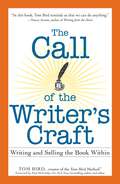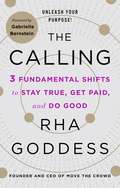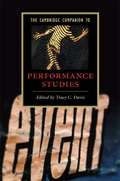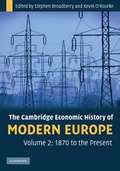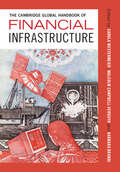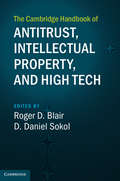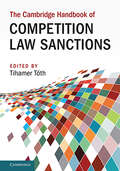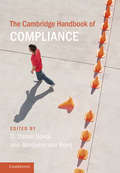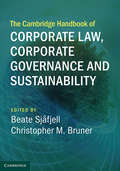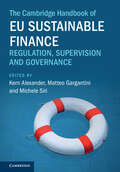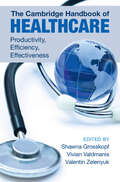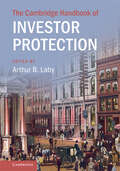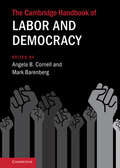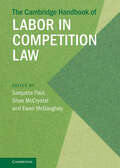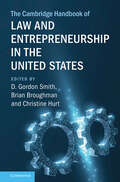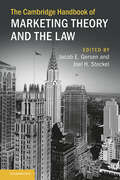- Table View
- List View
The Call of the Writer's Craft: Writing and Selling the Book Within
by Tom BirdGetting a book successfully published is as much about talent and creative drive as it is a matter of determination and business practice. Luckily for would-be authors, this book delivers the how-to on both the creativity and the business.Lecturer and writing retreat leader Tom Bird introduces authors to their Divine Author Within, and guides them through the process of listening to this inner muse. They will learn how to tap into their "creative connected mind" and relax their "logical critical mind" so they will be able to write the book they've always wanted to--in just two drafts!Once the book is complete, writers learn how to sell their book. Bird instructs his readers how to successfully navigate the publishing world so that they can make the right choices for their work.
The Calling: 3 Fundamental Shifts to Stay True, Get Paid, and Do Good
by Rha GoddessA game-changing book offering a six-step approach on how to find and follow your true calling and redefine success from entrepeneur and soul coach Rha Goddess.Are you willing to believe in you?Every single one of us has a calling.For most it’s the thing you have to force yourself not to do.When you try to ignore it, you can’t stop thinking about. It is the thing that both terrifies you and brings you the most joy. Already living yours? Great! How do you make the most of it? The Calling will provide readers with a road map, via 3 fundamental shifts, on how to stay true, get paid and do good. The steps that will help lead you there include: RECOGNIZING—it always begins with awareness. If you can’t see it then you can’t do anything about it.ACCEPTING—means embracing, and taking responsibility for yourself, your life, and the things that want or need to be changed.FORGIVING—yourself and others.AND MORE!The Calling will be the resource that people have been asking Rha to write for years, and there has never been a better time for her to share her proven method.
The Cambridge Companion to Adam Smith
by Knud HaakonssenAdam Smith is best known as the founder of scientific economics and as an early proponent of the modern market economy. Political economy, however, was only one part of Smith's comprehensive intellectual system. Consisting of a theory of mind and its functions in language, arts, science, and social intercourse, Smith's system was a towering contribution to the Scottish Enlightenment. His ideas on social intercourse also served as the basis for a moral theory that provided both historical and theoretical accounts of law, politics, and economics. This Companion volume provides an examination of all aspects of Smith's thought. Collectively, the essays take into account Smith's multiple contexts - Scottish, British, European, Atlantic; biographical, institutional, political, philosophical - and they draw on all of his works, including student notes from his lectures. Pluralistic in approach, the volume provides a contextualist history of Smith, as well as direct philosophical engagement with his ideas.
The Cambridge Companion to Hayek
by Edward FeserF. A. Hayek (1899-1992) was among the most important economists and political philosophers of the twentieth century. He is widely regarded as the principal intellectual force behind the triumph of global capitalism, an 'anti-Marx' who did more than any other recent thinker to elucidate the theoretical foundations of the free market economy. His account of the role played by market prices in transmitting economic knowledge constituted a devastating critique of the socialist ideal of central economic planning, and his famous book The Road to Serfdom was a prophetic statement of the dangers which socialism posed to a free and open society. He also made significant contributions to fields as diverse as the philosophy of law, the theory of complex systems, and cognitive science. The essays in this volume, by an international team of contributors, provide a critical introduction to all aspects of Hayek's thought.
The Cambridge Companion to Keynes
by Roger E. Backhouse Bradley W. BatemanJohn Maynard Keynes (1883-1946) was the most important economist of the twentieth century. He was also a philosopher who wrote on ethics and the theory of probability and was a central figure in the Bloomsbury Group of writers and artists. In this volume contributors from a wide range of disciplines offer new interpretations of Keynes's thought, explain the links between Keynes's philosophy and his economics, and place his work and Keynesianism - the economic theory, the principles of economic policy, and the political philosophy - in their historical context. Chapter topics include Keynes's philosophical engagement with G. E. Moore and Franz Brentano, his correspondence, the role of his General Theory in the creation of modern macroeconomics, and the many meanings of Keynesianism. New readers will find this the most convenient, accessible guide to Keynes currently available. Advanced students and specialists will find a conspectus of recent developments in the interpretation of Keynes.
The Cambridge Companion to Performance Studies
by Tracy C. DavisSince the turn of the century, Performance Studies has emerged as an increasingly vibrant discipline. Its concerns - embodiment, ethical research and social change - are held in common with many other fields, however a unique combination of methods and applications is used in exploration of the discipline. Bridging live art practices - theatre, performance art and dance - with technological media, and social sciences with humanities, it is truly hybrid and experimental in its techniques. This 2008 Companion brings together specially commissioned essays from leading scholars who reflect on their own experiences in Performance Studies and the possibilities this offers to representations of identity, self-and-other, and communities. Theories which have been absorbed into the field are applied to compelling topics in current academic, artistic and community settings. The collection is designed to reflect the diversity of outlooks and provide a guide for students as well as scholars seeking a perspective on research trends.
The Cambridge Economic History of Australia
by Simon Ville Glenn WithersAustralia's economic history is the story of the transformation of an indigenous economy and a small convict settlement into a nation of nearly 23 million people with advanced economic, social and political structures. It is a history of vast lands with rich, exploitable resources, of adversity in war, and of prosperity and nation building. It is also a history of human behaviour and the institutions created to harness and govern human endeavour. This account provides a systematic and comprehensive treatment of the nation's economic foundations, growth, resilience and future, in an engaging, contemporary narrative. It examines key themes such as the centrality of land and its usage, the role of migrant human capital, the tension between development and the environment, and Australia's interaction with the international economy. Written by a team of eminent economic historians, The Cambridge Economic History of Australia is the definitive study of Australia's economic past and present.
The Cambridge Economic History of Modern Britain
by Paul Johnson Jane Humphries Roderick Floud Roderick Floud Jane HumphriesThe Cambridge Economic History of Modern Britain is a comprehensive account of the economic history of Britain since 1700, based on the most up-to-date research. Roderick Floud and Paul Johnson have assembled well-known international scholars to produce a set of volumes which serve as a textbook for undergraduate students as well as an authoritative reference guide to the subject.
The Cambridge Economic History of Modern Britain
by Paul Johnson Jane Humphries Roderick Floud Roderick Floud Jane HumphriesThe Cambridge Economic History of Modern Britain is a comprehensive account of the economic history of Britain since 1700, based on the most up-to-date research. Roderick Floud and Paul Johnson have assembled well-known international scholars to produce a set of volumes which serve as a textbook for undergraduate students as well as an authoritative reference guide to the subject.
The Cambridge Economic History of Modern Britain
by Paul Johnson Roderick FloudThe Cambridge Economic History of Modern Britain is a comprehensive account of the economic history of Britain since 1700, based on the most up-to-date research. Roderick Floud and Paul Johnson have assembled well-known international scholars to produce a set of volumes which serve as a textbook for undergraduate students as well as an authoritative reference guide to the subject.
The Cambridge Economic History of Modern Europe, Volume 2: 1870 to the Present
by Kevin H. O'Rourke Stephen BroadberryUnlike most existing textbooks on the economic history of modern Europe, which offer a country-by-country approach, The Cambridge Economic History of Modern Europe rethinks Europe's economic history since 1700 as unified and pan-European, with the material organized by topic rather than by country. This second volume tracks Europe's economic history through three major phases since 1870. The first phase was an age of globalization and of European economic and political dominance that lasted until the First World War. The second, from 1914 to 1945, was one of war, deglobalization, and depression and the third was one of growing integration not only within Europe but also between Europe and the global economy. Leading authors offer comprehensive and accessible introductions to these patterns of globalization and deglobalization as well as to key themes in modern economic history such as economic growth, business cycles, sectoral developments, and population and living standards.
The Cambridge Global Handbook of Financial Infrastructure
by Malcolm Campbell-Verduyn Barbara Brandl Carola WestermeierFinancial infrastructures are the lifeblood of political economies and are consistently considered critical by governments. They encapsulate socio-technical processes; not merely cables and computer servers, but the relationship of those in finance to these and other physical objects. The Cambridge Global Handbook of Financial Infrastructure consolidates the study of financial infrastructures by bridging political economy, humanities, sociology and science and technology studies. It delves into the core questions of modern finance, from the effect of digitalization on financial functions to the intricate web of global power dynamics. Drawing together interdisciplinary research, it explores the nuances of inclusivity and exclusivity within financial systems, shedding light on historical inequalities and colonial legacies. Including fresh insights, compelling case studies, and conceptual advances, this essential volume offers invaluable perspectives for informing analysis of the past, present, future of finance, and shaping policy debates. This title is also available as Open Access on Cambridge Core.
The Cambridge Handbook of Antitrust, Intellectual Property, and High Tech
by Blair Sokol D. Daniel Roger D.This Cambridge Handbook, edited by Roger D. Blair and D. Daniel Sokol, brings together a group of world-renowned professors in the fields of law and economics to assess the theory and practice of antitrust, intellectual property, and high tech. With the increased globalization of antitrust, a better understanding of how law and economics shape this interface will help academics, policymakers, and practitioners to understand the existing state of academic literature, its limits, and its relevance to real-world antitrust. The book will be an essential resource for anyone seeking to understand academic and policy considerations shaping the world of antitrust, intellectual property, and high tech.
The Cambridge Handbook of Competition Law Sanctions (Cambridge Law Handbooks)
by Tihamer TóthThis handbook brings together an international roster of competition law scholars and practitioners to address the issue of sanctions in competition law from all angles. Covering nineteen jurisdictions around the world, the book analyzes the theoretical foundations and practice of sanctioning competition law infringements and, most importantly, cartels. Contributors include a range of experts drawing on criminal law, company law, labor law, human rights, and law and economics, to determine what sanctions are available as a matter of positive law against corporations and individuals, including fines and other criminal, administrative, and civil law sanctions; whether law enforcers are using these sanctions effectively; and if new sanctions – including individual sanctions – should be introduced.
The Cambridge Handbook of Compliance (Cambridge Law Handbooks)
by D. Daniel Sokol Benjamin Van RooijCompliance has become key to our contemporary markets, societies, and modes of governance across a variety of public and private domains. While this has stimulated a rich body of empirical and practical expertise on compliance, thus far, there has been no comprehensive understanding of what compliance is or how it influences various fields and sectors. The academic knowledge of compliance has remained siloed along different disciplinary domains, regulatory and legal spheres, and mechanisms and interventions. This handbook bridges these divides to provide the first one-stop overview of what compliance is, how we can best study it, and the core mechanisms that shape it. Written by leading experts, chapters offer perspectives from across law, regulatory studies, management science, criminology, economics, sociology, and psychology. This volume is the definitive and comprehensive account of compliance.
The Cambridge Handbook of Consumer Privacy
by Evan Selinger Jules Polonetsky Omer TeneBusinesses are rushing to collect personal data to fuel surging demand. Data enthusiasts claim personal information that's obtained from the commercial internet, including mobile platforms, social networks, cloud computing, and connected devices, will unlock path-breaking innovation, including advanced data security. By contrast, regulators and activists contend that corporate data practices too often disempower consumers by creating privacy harms and related problems. <P><P>As the Internet of Things matures and facial recognition, predictive analytics, big data, and wearable tracking grow in power, scale, and scope, a controversial ecosystem will exacerbate the acrimony over commercial data capture and analysis. The only productive way forward is to get a grip on the key problems right now and change the conversation. <P>That's exactly what Jules Polonetsky, Omer Tene, and Evan Selinger do. They bring together diverse views from leading academics, business leaders, and policymakers to discuss the opportunities and challenges of the new data economy.<P> Proposes a new view of the consumer privacy debates.<P> Provides an interdisciplinary account of consumer privacy issues that includes contributions from industry leaders, activists, and policymakers.<P> Offers new pathways forward to move us beyond the current consumer privacy impasses.<P>
The Cambridge Handbook of Consumer Psychology
by Michael I. Norton Derek D. Rucker Norton, Michael I. and Rucker, Derek D. and Lamberton, Cait Cait LambertonWhy do consumers make the purchases they do, and which ones make them truly happy? Why are consumers willing to spend huge sums of money to appear high status? This handbook addresses these key questions and many more. It provides a comprehensive overview of consumer psychology, examining cutting-edge research at the individual, interpersonal, and societal levels. Leading scholars summarize past and current findings and consider future lines of inquiry to deepen our understanding of the psychology behind consumers' decision making, their interactions with other consumers, and the effects of societal factors on consumption. The Cambridge Handbook of Consumer Psychology will act as a valuable guide for faculty as well as graduate and undergraduate students in psychology, marketing, management, sociology, and anthropology.
The Cambridge Handbook of Corporate Law, Corporate Governance and Sustainability (Cambridge Law Handbooks)
by Christopher M. Bruner Beate SjåfjellThe emerging field of corporate law, corporate governance and sustainability is one of the most dynamic and significant areas of law and policy in light of the convergence of environmental, social and economic crises that we face as a global society. Understanding the impact of the corporation on society and realizing its potential for contributing to sustainability is vital for the future of humanity. This Handbook comprehensively assesses the state-of-the-art in this field through in-depth discussion of sustainability-related problems, numerous case studies on regulatory responses implemented by jurisdictions around the world, and analyses of predominant strategies and potential drivers of change. This Handbook will be an essential reference for scholars, students, practitioners, policymakers, and general readers interested in how corporate law and governance have exacerbated global society's most pressing challenges, and how reforms to these fields can help us resolve those challenges and achieve sustainability.
The Cambridge Handbook of EU Sustainable Finance: Regulation, Supervision and Governance (Cambridge Law Handbooks)
by Kern Alexander Michele Siri Matteo GargantiniThis essential reference work explores the role of finance in delivering sustainability within and outside the European Union. With sustainability affecting core elements of company, banking and capital markets law, this handbook investigates the latest regulatory strategies for protecting the environment, delivering a fairer society and improving governance. Each chapter is written by a leading scholar who provides a solid theoretical approach to the topic while focussing on recent developments. Looking beyond the European Union, the book also covers relevant developments in the United States, the United Kingdom and other major jurisdictions. Thorough and comprehensive, this volume is a crucial resource for scholars, policymakers and practitioners who aim for a greener world, a more equitable society and better-managed corporations.
The Cambridge Handbook of Healthcare: Productivity, Efficiency, Effectiveness
by Shawna Grosskopf Vivian Valdmanis Valentin ZelenyukHealthcare is inextricably bound to productivity, efficiency, and economic development. Although many methods for analyzing productivity and efficiency have been extensively covered, relatively little focus has been placed on how those methods can be applied to health care in a coherent and comprehensive manner. The Cambridge Handbook of Healthcare outlines current foundations and states of the art on which future research can build. It brings together experts in this growing field to cover three key sources and aspects of human welfare – productivity, efficiency, and healthcare. Beginning with academic focused chapters, this book bridges and provides outreach to the practice and regulation of the health care industry and includes academic and regulatory perspectives, including overviews of major evidence from international empirical applications. Each chapter is dedicated to a particular topic and delivered by international experts on that topic.
The Cambridge Handbook of Investor Protection (Cambridge Law Handbooks)
by Arthur B. LabyThe topic of investor protection has occupied investors, businesses, regulators, academics, and courts since the 1930s. The topic exploded in importance after the 2008 financial crisis and the Bernard Madoff Ponzi scheme of the same year. Investor protection scholarship now seeks to respond to developments such as the institutionalization of the markets, the democratization of finance, and the enhanced role of market professionals and other gatekeepers. Additionally, although the philosophy of full disclosure remains the guiding principle behind the securities laws, recent research has questioned the merits of a disclosure-based regime. In light of these trends, regulators try to strike the right balance between imposing a strict investor protection regime, on the one hand, and giving businesses the freedom to innovate new projects, market new services, and reduce costs, on the other. The Cambridge Handbook of Investor Protection brings together leading scholars to inform this debate and fill a gap left by these developments.
The Cambridge Handbook of Labor and Democracy (Cambridge Law Handbooks)
by Angela B. Cornell Mark BarenbergWe are currently witnessing some of the greatest challenges to democratic regimes since the 1930s, with democratic institutions losing ground in numerous countries throughout the world. At the same time organized labor has been under assault worldwide, with steep declines in union density rates. In this timely handbook, scholars in law, political science, history, and sociology explore the role of organized labor and the working class in the historical construction of democracy. They analyze recent patterns of democratic erosion, examining its relationship to the political weakening of organized labor and, in several cases, the political alliances forged by workers in contexts of nationalist or populist political mobilization. The volume breaks new ground in providing cross-regional perspectives on labor and democracy in the United States, Europe, Latin America, Africa, and Asia. Beyond academia, this volume is essential reading for policymakers and practitioners concerned with the relationship between labor and democracy.
The Cambridge Handbook of Labor in Competition Law The Cambridge Handbook of Labor in Competition Law (Cambridge Law Handbooks)
by Shae McCrystal Ewan McGaughey Sanjukta PaulAs scholars and policymakers around the world seek a systematic approach to the question of 'gig work,' one of its regulatory dimensions – the intersection of labor and competition law – points toward a deeper reconceptualization of the conventional legal and economic categories typically brought to bear upon it. A comparative approach to the question of gig work further reveals the variety and contingency of background assumptions that are often overlooked in the context of domestic policy debates. By combining a detailed comparative doctrinal survey of the regulation of non-employee workers in domestic competition law systems with a set of essays reframing the underlying questions raised – in terms of international legal frameworks, freedom of association norms, alternative approaches to law and economics, and more – The Cambridge Handbook of Labor in Competition Law moves the debates over the fissured workplace and the labor – competition law intersection forward in novel ways.
The Cambridge Handbook of Law and Entrepreneurship in the United States (Cambridge Law Handbooks)
by D. Gordon Smith Brian J. Broughman Christine HurtLaw plays a key role in determining the level of entrepreneurial action in society. Legal rules seek to define property rights, facilitate private ordering, and impose liability for legal wrongs, thereby attempting to establish conditions under which individuals may act. These rules also channel the development of technology, regulate information flows, and determine parameters of competition. Depending on their structure and implementation, legal rules can also discourage individuals from acting. It is thus crucial to determine which legal rules and institutions best enable entrepreneurs, whose core function is to challenge incumbency. This volume assembles legal experts from diverse fields to examine the role of law in facilitating or impeding entrepreneurial action. Contributors explore issues arising in current policy debates, including the incentive effect of legal rules on startup activity; the role of law in promoting or foreclosing market entry; and the effect of entrepreneurial action on legal doctrine.
The Cambridge Handbook of Marketing and the Law (Cambridge Law Handbooks)
by Jacob E. Gersen Joel H. SteckelThis handbook examines a wide range of current legal and policy issues at the intersection of marketing and the law. Focusing on legal outcomes that depend on measurements and interpretations of consumer and firm behavior, the chapters explore how consumers form preferences, perceptions, and beliefs, and how marketers influence them. Specific questions include the following: How should trademark litigation be valued and patent damages assessed? What are the challenges in doing so? What divides certain marketing claims between fact and fiction? Can a litigant establish secondary meaning without a survey? How can one extract evidence on consumer behavior with the explosion of social media? This unique volume at the intersection of marketing and the law brings together an international roster of scholars to answer these questions and more.
